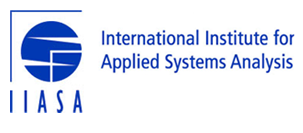Effective radiative forcing of short-lived climate forcer (Figure 2.8)¶
Notebook sr15_2.3.3_short-lived_climate_forcers_radiative_forcing¶
This notebook is based on the Release 1.1 of the IAMC 1.5C Scenario Explorer and Data and refers to the published version of the IPCC Special Report on Global Warming of 1.5C (SR15).
The notebook is run with pyam release 0.5.0.
The source code of this notebook is available on GitHub (release 2.0.2).
IPCC SR15 scenario assessment¶


Analysis of radiative forcing from short-lived climate-forcers¶
This notebook plots the radiative forcing from short-lived climate forcers (SLCF) shown in Figure 2.8 of the IPCC's "Special Report on Global Warming of 1.5°C".
The scenario data used in this analysis can be accessed and downloaded at https://data.ene.iiasa.ac.at/iamc-1.5c-explorer.
Load pyam package and other dependencies¶
import pandas as pd
import numpy as np
import io
import itertools
import yaml
import math
import matplotlib.pyplot as plt
plt.style.use('style_sr15.mplstyle')
%matplotlib inline
import pyam
from utils import boxplot_by_cat
Import scenario data, categorization and specifications files¶
The metadata file with scenario categorisation and quantitative indicators can be downloaded at https://data.ene.iiasa.ac.at/iamc-1.5c-explorer.
Alternatively, it can be re-created using the notebook sr15_2.0_categories_indicators.
The last cell of this section loads and assigns a number of auxiliary lists as defined in the categorization notebook.
sr1p5 = pyam.IamDataFrame(data='../data/iamc15_scenario_data_world_r2.0.xlsx')
sr1p5.load_meta('sr15_metadata_indicators.xlsx')
with open("sr15_specs.yaml", 'r') as stream:
specs = yaml.load(stream, Loader=yaml.FullLoader)
rc = pyam.run_control()
for item in specs.pop('run_control').items():
rc.update({item[0]: item[1]})
cats = specs.pop('cats')
all_cats = specs.pop('all_cats')
subcats = specs.pop('subcats')
all_subcats = specs.pop('all_subcats')
plotting_args = specs.pop('plotting_args')
marker= specs.pop('marker')
Downselect scenario ensemble to categories of interest for this assessment¶
years = [2010, 2020, 2030, 2050, 2100]
cats.remove('Above 2C')
sr1p5.meta.rename(columns={'Kyoto-GHG|2010 (SAR)': 'kyoto_ghg_2010'}, inplace=True)
df = sr1p5.filter(kyoto_ghg_2010='in range', category=cats, year=years)
Set specifications for filter and plotting¶
save_name = 'output/fig2.8_effective_radiative_forcing.{}'
filter_args = dict(df=sr1p5, category=cats, marker=None, join_meta=True)
def plotting_args(filetype='png'):
return {'categories': cats, 'column': 'category',
'years': years, 'add_marker': marker,
'save': save_name.format(filetype)}
Compute radiative forcing from short-lived climate forcers¶
df.filter(variable='AR5 climate diagnostics|Forcing|CO2|*').variables()
rf_llcf_vars = [
'AR5 climate diagnostics|Forcing|CO2|FAIR|MED',
'AR5 climate diagnostics|Forcing|N2O|FAIR|MED'
]
for v in ['AR5 climate diagnostics|Forcing|FAIR|MED'] + rf_llcf_vars:
df.require_variable(v, exclude_on_fail=True)
df.filter(exclude=False, inplace=True)
rf_all = df.filter(variable='AR5 climate diagnostics|Forcing|FAIR|MED').timeseries()
rf_all.index = rf_all.index.droplevel([2, 3, 4])
rf_llcf = df.filter(variable=rf_llcf_vars).timeseries()
rf_llcf = rf_llcf.groupby(pyam.META_IDX).sum()
rf_slcf = rf_all - rf_llcf
data = pyam.filter_by_meta(rf_slcf, **filter_args)
boxplot_by_cat(data, **plotting_args(),
ylabel='Effective radiative forcing (W/m2)', )
Export timeseries data to xlsx¶
data.reset_index().to_excel('output/fig2.8_data_table.xlsx')